|
|
|
Sort Order |
|
|
|
Items / Page
|
|
|
|
|
|
|
| Srl | Item |
| 1 |
ID:
157068
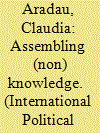

|
|
|
|
|
| Summary/Abstract |
Critical analyses of security have focused on the production of knowledge, techniques, and devices that tame unknowns and render social problems actionable. Drawing on insights from, science and technology studies and the emerging interdisciplinary field of “ignorance studies,” this article proposes to explore the enactment of non-knowledge in security and legal practices. Starting with legal challenges brought against the NSA and other intelligence agencies after the Snowden revelations about mass surveillance, it shows how different modes of non-knowledge are enacted and not just “tamed”: uncertainty, ignorance, secrecy, ambiguity, and error. The enactment of non-knowledge has important implications for how we understand security practices, the relation between security and law, and public challenges to mass surveillance in a digital world. On the one hand, the enactment of non-knowledge by security and legal professionals limits activist and NGO resistance to mass surveillance, when these are focused on claims to knowledge, disclosure, and transparency. On the other, reassembling non-knowledge and knowledge differently has generative political effects and opens new possibilities for intervention and resistance.
|
|
|
|
|
|
|
|
|
|
|
|
|
|
|
|
| 2 |
ID:
164285
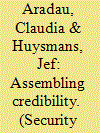

|
|
|
|
|
| Summary/Abstract |
Critical approaches in security studies have been increasingly turning to methods and standards internal to knowledge practice to validate their knowledge claims. This quest for scientific standards now also operates against the background of debates on ‘post-truth’, which raise pressing and perplexing questions for critical lines of thought. We propose a different approach by conceptualizing validity as practices of assembling credibility in which the transversal formation and circulation of credits and credentials combine with disputes over credence and credulity. This conceptualization of the validity of (critical) security knowledge shifts the focus from epistemic and methodological standards to transepistemic practices and relations. It allows us to mediate validity critically as a sociopolitical rather than strictly scientific accomplishment. Developing such an understanding of validity makes it possible for critical security studies and international relations to displace epistemic disputes about ‘post-truth’ with transversal practices of knowledge creation, circulation and accreditation.
|
|
|
|
|
|
|
|
|
|
|
|
|
|
|
|
| 3 |
ID:
172344
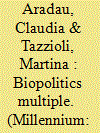

|
|
|
|
|
| Summary/Abstract |
This article proposes ‘biopolitics multiple’ as an approach to the heterogeneity of biopolitical technologies deployed to govern migration today. Building on work that has started to develop analytical vocabularies to diagnose biopolitical technologies that work neither by fostering life nor by making people die in a necropolitical sense, it conceptualises ‘extraction’ and ‘subtraction’ as two such technologies that take ‘hold’ of migrants’ lives today. Extraction, explored in the article through a focus on borderzones in Greece, captures the imbrication of biopolitics and value through the ‘outside’ creation of the economic conditions of data circulation. Subtraction, which is analysed in this article through a focus on Calais, captures the practices of (partial) non-governing by taking material and legal terrain away from migrants and reconfiguring convoluted geographies of (forced) hyper-mobility. This move allows us to understand the governmentality of migration beyond binary oppositions such as ‘making live/letting die’, biopolitics/necropolitics and inclusion/exclusion.
|
|
|
|
|
|
|
|
|
|
|
|
|
|
|
|
| 4 |
ID:
184310
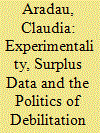

|
|
|
|
|
| Summary/Abstract |
The use of digital devices and the collection of digital data have become pervasive in borderzones. Whether deployed by state or non-state actors, digital devices are rolled out despite intense criticism and controversy. In this article, I propose to approach these interventions through the prism of experimentality. Experimentality was initially formulated in the anthropological literature on the globalisation of clinical trials and, more recently, revisited in feminist science and technology studies. Drawing on this work, I argue that experimentality has become a rationality of governing in borderzones, which renders social relations continuously decomposable and recomposable by inserting mundane (digital) devices into the world. The introduction of various digital devices in Greece since 2015, starting with Skype for the pre-registration of asylum seekers, helps shed light on a particular form of governing through experiments without protocol. This form of experimentality has specific political effects for migrants’ lives. Firstly, experimentality builds upon and intensifies neoliberalism by rearranging rather than redressing precarity. In so doing, experimentality through digital devices produces debilitation rather than better connectivity or access to asylum. Secondly, migrants become not only subjects of surveillance, but subjects of extraction of ‘surplus data’ which entangles their lives into the circuits of digital platforms.
|
|
|
|
|
|
|
|
|
|
|
|
|
|
|
|
| 5 |
ID:
161267
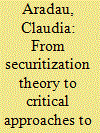

|
|
|
| 6 |
ID:
157740
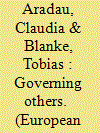

|
|
|
|
|
| Summary/Abstract |
As digital technologies and algorithmic rationalities have increasingly reconfigured security practices, critical scholars have drawn attention to their performative effects on the temporality of law, notions of rights, and understandings of subjectivity. This article proposes to explore how the ‘other’ is made knowable in massive amounts of data and how the boundary between self and other is drawn algorithmically. It argues that algorithmic security practices and Big Data technologies have transformed self/other relations. Rather than the enemy or the risky abnormal, the ‘other’ is algorithmically produced as anomaly. Although anomaly has often been used interchangeably with abnormality and pathology, a brief genealogical reading of the concept shows that it works as a supplementary term, which reconfigures the dichotomies of normality/abnormality, friend/enemy, and identity/difference. By engaging with key practices of anomaly detection by intelligence and security agencies, the article analyses the materialisation of anomalies as specific spatial ‘dots’, temporal ‘spikes’, and topological ‘nodes’. We argue that anomaly is not simply indicative of more heterogeneous modes of othering in times of Big Data, but represents a mutation in the logics of security that challenge our extant analytical and critical vocabularies.
|
|
|
|
|
|
|
|
|
|
|
|
|
|
|
|
| 7 |
ID:
076864
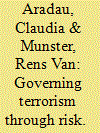

|
|
|
|
|
| Publication |
2007.
|
| Summary/Abstract |
The events of 9/11 appeared to make good on Ulrich Beck's claim that we are now living in a (global) risk society. Examining what it means to 'govern through risk', this article departs from Beck's thesis of risk society and its appropriation in security studies. Arguing that the risk society thesis problematically views risk within a macro-sociological narrative of modernity, this article shows, based on a Foucauldian account of governmentality, that governing terrorism through risk involves a permanent adjustment of traditional forms of risk management in light of the double infinity of catastrophic consequences and the incalculability of the risk of terrorism. Deploying the Foucauldian notion of 'dispositif', this article explores precautionary risk and risk analysis as conceptual tools that can shed light on the heterogeneous practices that are defined as the 'war on terror'.
|
|
|
|
|
|
|
|
|
|
|
|
|
|
|
|
| 8 |
ID:
084696
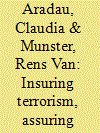

|
|
|
| 9 |
ID:
185784
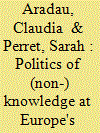

|
|
|
|
|
| Summary/Abstract |
From statistical calculations to psychological knowledge, from profiling to scenario planning, and from biometric data to predictive algorithms, International Relations scholars have shed light on the multiple forms of knowledge deployed in the governing of populations and their political effects. Recent scholarship in critical border and security studies has drawn attention to ‘the other side of knowledge’ and has developed a vibrant conversation with the emergent interdisciplinary field of ignorance studies. This article proposes to advance these conversations on governing through non-knowledge by nuancing the analysis of power/(non-)knowledge/subjectivity relations. Firstly, we expand the analysis of non-knowledge by attending to the problematisation of errors and fakes in controversies at Europe's borders. Errors have emerged in relation to border actors’ practices and technologies, while migrant practices, documentation, and narratives are deemed to be potentially ‘fake’, ‘fraudulent’, or ‘false’. Secondly, we explore how different subjectivities are produced through regimes of error/truth and fake/authenticity. We argue that there are important epistemic differences between ‘fake’ and ‘error’, that they are entangled with different techniques of power and produce highly differentiated subjectivities. Finally, we attend to how these subjectivities are enacted within racialised hierarchies and ask whether non-knowledge can be mobilised to challenge these hierarchies.
|
|
|
|
|
|
|
|
|
|
|
|
|
|
|
|
| 10 |
ID:
127054
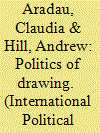

|
|
|
|
|
| Publication |
2013.
|
| Summary/Abstract |
Drawing has been largely neglected in discussions of visuality, conflict, and violence. In 2007, the International Criminal Court accepted 500 children's drawings depicting the conflict in Darfur as contextual evidence for war crime trials against Sudanese officials. Starting from this event, and the attention that the Darfuri children's drawings have garnered internationally, this article explores the role that drawings, and children's drawings in particular, play in the visualization of conflict and violence. Rather than focusing primarily on the relation between image and text, the article argues that visuality needs to be understood as both an aesthetic and social object, whose production, circulation, and reception transform its political effects. It then shows how children's drawings are both differentially produced, and productive of difference and ambivalence, in the "truthfulness" of conflict.
|
|
|
|
|
|
|
|
|
|
|
|
|
|
|
|
| 11 |
ID:
114568
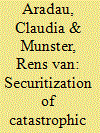

|
|
|
|
|
| Publication |
2012.
|
| Summary/Abstract |
Psychological knowledge has become incorporated into a range of security practices, discourses, and interventions in catastrophic events, including terrorism. By engaging the existing literature on the medicalization and psychologization of security, this article reads the enactment knowledge deployed in preparedness exercises from the perspective of psychodrama and sociodrama rather than that of psychoanalysis or psychosocial risk management. Enactment has become an important mode of knowledge for the governance of terrorism, as preparedness exercises deploy action methods, drama, enactment, and performance to prepare for unexpected, catastrophic events. Taking seriously the conceptualization of enactment, as deployed in psychodrama and sociodrama, can also challenge the securitization of catastrophic events. The article concludes that enactment, which foregrounds action rather than speech, and suggests that meaning follows action, can also offer critical insights into securitization theory.
|
|
|
|
|
|
|
|
|
|
|
|
|
|
|
|
| 12 |
ID:
101001
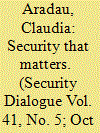

|
|
|
|
|
| Publication |
2010.
|
| Summary/Abstract |
Critical infrastructure protection is prominently concerned with objects that appear indispensable for the functioning of social and political life. However, the analysis of material objects in discussions of critical infrastructure protection has remained largely within the remit of managerial responses, which see matter as simply passive, a blank slate. In security studies, critical approaches have focused on social and cultural values, forms of life, technologies of risk or structures of neoliberal globalization. This article engages with the role of 'things' or of materiality for theories of securitization. Drawing on the materialist feminism of Karen Barad, it shows how critical infrastructure in Europe neither is an empty receptacle of discourse nor has 'essential' characteristics; rather, it emerges out of material-discursive practices. Understanding the securitization of critical infrastructure protection as a process of materialization allows for a reconceptualization of how security matters and its effects.
|
|
|
|
|
|
|
|
|
|
|
|
|
|
|
|
| 13 |
ID:
117764
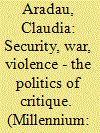

|
|
|
|
|
| Publication |
2012.
|
| Summary/Abstract |
Tarak Barkawi has recently enjoined International Relations and security studies scholars to embark upon a critical study of the phenomenon of war. There is much to agree with in his argument and the idea of 'critical war studies' seems particularly apposite in a world where war and other forms of organised or dispersed violence have become increasingly constitutive of daily life. However, the turn to 'critical war studies' works by silencing disagreements and homogenising the heterogeneity of critical security studies. Instead, I propose a dialogue that brings to the fore the political stakes of a critique of war, security and violence. Not only have security and war been entwined in complex ways, but I argue that they need to be analysed within a continuum of violence that includes insurrections, revolts, revolutions, insurgencies, rebellions, seditions, disobediences, riots and uprisings.
|
|
|
|
|
|
|
|
|
|
|
|
|
|
|
|
|
|
|
|
|